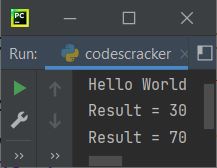- Python Built-in Functions
- Python All Built-in Functions
- Python print() Function
- Python input() Function
- Python int() Function
- Python float() Function
- Python len() Function
- Python range() Function
- Python str() Function
- Python ord() Function
- Python chr() Function
- Python ascii() Function
- Python pow() Function
- Python type() Function
- Python List Functions
- Python list() Function
- Python insert() Function
- Python append() Function
- Python extend() Function
- Python pop() Function
- Python remove() Function
- Python reverse() Function
- Python sort() Function
- Python sorted() Function
- Python Dictionary Functions
- Python dict() Function
- Python update() Function
- Python get() Function
- Python keys() Function
- Python setdefault() Function
- Python fromkeys() Function
- Python items() Function
- Python popitem() Function
- Python Tuple Function
- Python tuple() Function
- Python Set Functions
- Python set() Function
- Python frozenset() Function
- Python String Functions
- Python split() Function
- Python join() Function
- Python format() Function
- Python replace() Function
- Python Iterator Functions
- Python iter() Function
- Python min() Function
- Python max() Function
- Python sum() Function
- Python count() Function
- Python index() Function
- Python copy() Function
- Python clear() Function
- Python next() Function
- Python filter() Function
- Python enumerate() Function
- Python zip() Function
- Python reversed() Function
- Python Number Functions
- Python abs() Function
- Python bin() Function
- Python oct() Function
- Python hex() Function
- Python round() Function
- Python divmod() Function
- Python complex() Function
- Python File Handling Functions
- Python open() Function
- Python read() Function
- Python readable() Function
- Python readline() Function
- Python readlines() Function
- Python write() Function
- Python writable() Function
- Python writelines() Function
- Python close() Function
- Python seek() Function
- Python tell() Function
- Python flush() Function
- Python fileno() Function
- Python truncate() Function
- Python Class Functions
- Python object() Function
- Python property() Function
- Python getattr() Function
- Python setattr() Function
- Python hasattr() Function
- Python delattr() Function
- Python classmethod() Function
- Python staticmethod() Function
- Python issubclass() Function
- Python super() Function
- Python Misc Functions
- Python all() Function
- Python any() Function
- Python isatty() Function
- Python bool() Function
- Python callable() Function
- Python globals() Function
- Python locals() Function
- Python dir() Function
- Python id() Function
- Python isinstance() Function
- Python map() Function
- Python repr() Function
- Python slice() Function
- Python vars() Function
- Python Advance Functions
- Python help() Function
- Python hash() Function
- Python breakpoint() Function
- Python bytes() Function
- Python bytearray() Function
- Python memoryview() Function
- Python compile() Function
- Python eval() Function
- Python exec() Function
- Python Tutorial
- Python Tutorial
- Python Examples
- Python Examples
Python staticmethod() Function
The staticmethod() function in Python returns the static method of a specified function, or converts to a static method. For example:
class CodesCracker: def myfun(x): print("The value of x:", x) staticmethod(CodesCracker.myfun) CodesCracker.myfun(500)
The output produced by this Python program is:
The value of x: 500
The method myfun() gets converted into a static method after using the following statement:
staticmethod(CodesCracker.myfun)
Since the method myfun() becomes a static method, therefore the first parameter to myfun(), will not be considered as self. The self refers to the object instance.
Static methods do not have access to what the class is, whereas class methods have.
Recommend - Use @staticmethod decorator to define static methods, instead of using staticmethod() function to convert to a static method.
Note: A static method can be called by an object or by a class, both.
Python staticmethod() Function Syntax
The syntax of staticmethod() in Python is:
staticmethod(fun)
Python staticmethod() Function Example
Here is an example of staticmethod() in Python. In this program, I've created three methods inside the class. The first method is created to print "Hello World", the second method is created to return the addition of its two parameters, and the third method is similar to the second but without return statement:
class CodesCracker: def funOne(): print("Hello World") def funTwo(a, b): return a+b def funThree(x, y): print("Result =", x+y) staticmethod(CodesCracker.funOne) CodesCracker.funOne() staticmethod(CodesCracker.funTwo) res = CodesCracker.funTwo(10, 20) print("Result =", res) staticmethod(CodesCracker.funThree) CodesCracker.funThree(30, 40)
The snapshot given below shows the sample output of above program:

Related Article - Python class method Vs static method.
« Previous Function Next Function »